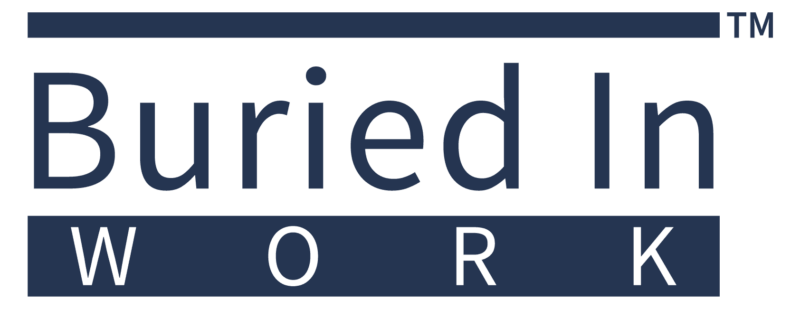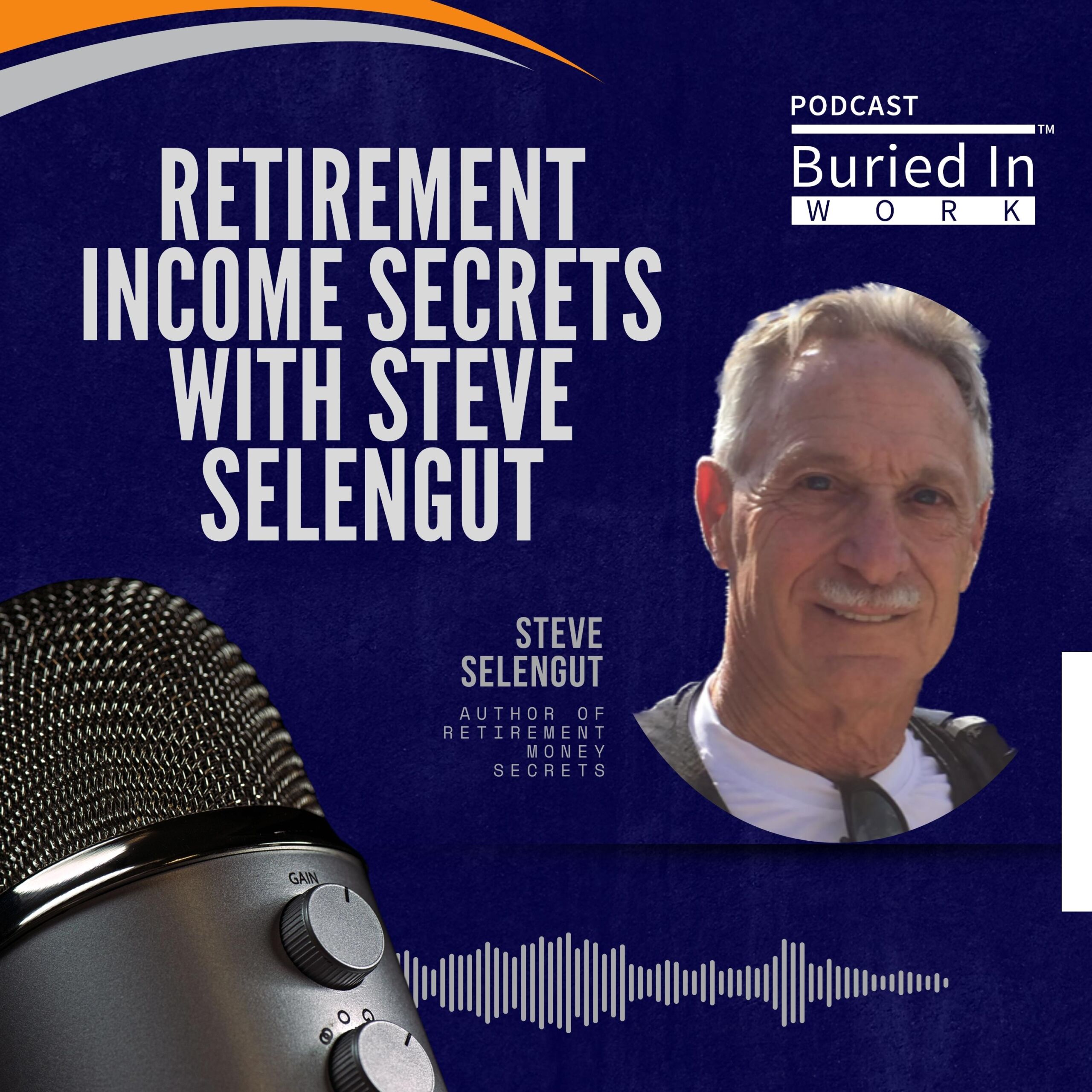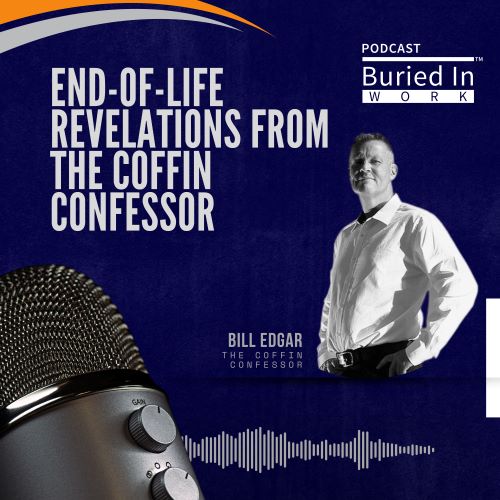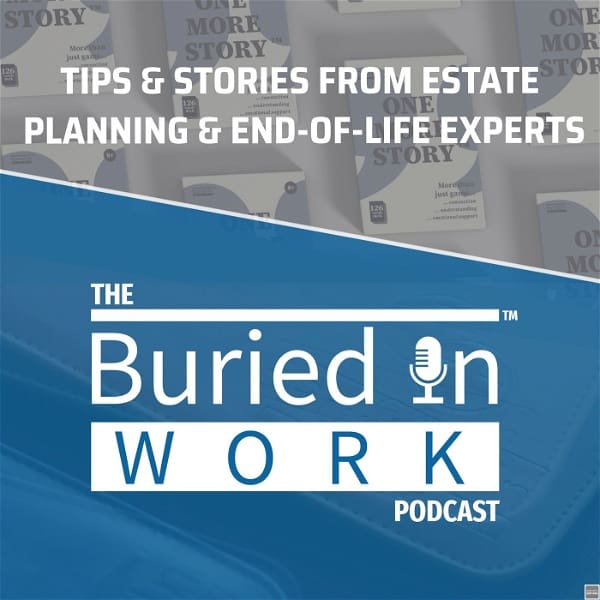Episode Notes
If you’ve ever worried about outliving your savings or wondered how to secure a stable retirement, this episode is for you. In this powerful episode of Buried in Work, host Adam Zuckerman sits down with financial expert Steve Selengut, author of Retirement Money Secrets and a seasoned expert in income-focused retirement planning.
Steve shares emotional and practical insights from his 40+ years managing over $110 million in assets. Imagine retiring with the confidence that your income will never run out. Steve Selingut’s strategies provide not just financial security, but peace of mind. No more worrying about market volatility or wondering if your savings will last. By focusing on income-generating investments, you can enjoy retirement, travel, and live life fully, knowing your finances are secure.
This is your opportunity to stop chasing market value and start building the financial foundation that will carry you through retirement and beyond.
Takeaways:
- Focus on Steady Income: Build your portfolio around income-generating assets that provide financial security throughout retirement.
- See Market Volatility as Opportunity: Don’t fear market dips; use them to invest in high-quality assets at discounted prices.
- Diversify for Stability: Spread your investments across different asset types to reduce risk and increase income.
- Regularly Take Profits: Reinvest your profits to grow your portfolio and ensure long-term financial independence.
- Incorporate Estate Planning: Align your retirement and estate planning strategies to protect your wealth and efficiently transfer it to your heirs.
Show links:
• Retirement Money Secrets by Steve Selingut: Available on Amazon and Audible.
• Visit Steve’s website: https://theincomecoach.net/
About Steve Selengut
Steve Selengut has been a private investment portfolio manager for over 50 years, 44 of which were spent managing up to 300 individual investment portfolios across the USA and internationally. By the time he sold his business in 2023, he had more than $110 million in assets under management for approximately 140 clients. Among the top-selling investment book authors on Amazon, only two were professional investors, and none had direct experience managing other people's money.
There are few private portfolio managers today, and even fewer who can offer personalized service distinct from a model portfolio approach—where most portfolios are identical in terms of content, trading, selection criteria, and income production. The industry has moved towards a one-size-fits-all, low-income production model. But this doesn't have to be the case.
Steve wrote Retirement Money Secrets to demonstrate how he consistently generated more income for his clients than they needed, year after year, for decades. Nearly half of that income was reinvested to grow the following year's production. The book includes examples and links to people who can attest to the process and its potential.
Transcript
Buried in Work Host 00:00
This is the Buried in Work podcast, where we share tips and interview experts to help you simplify estate planning and end of life tasks.
Adam Zuckerman 00:09
I'm your host, Adam Zuckerman, and today we have a very special guest, Steve Selengut. Steve is the author of Retirement Money Secrets, a book that explains the six basic principles needed to safely steer investment portfolios into and through retirement without dipping into principle.
He's a 40 -plus year professional investment manager
that used to manage more than $110 million and he now provides financial retirement strategies that ensure that his clients' assets are protected and efficiently transferred to their beneficiaries when that time comes. Today, Steve's here to share his insights on income -focused investment strategies and how they can help secure a financially stable retirement. Welcome, Steve.
Steve Selengut 00:47
Adam, it's good to be with you.
Adam Zuckerman 00:49
I'm glad you're here.
Steve Selengut 00:50
I've been looking forward to this conversation.
Adam Zuckerman 00:52
Me too. Now let's hop in.
So you used to manage other people's money, 43 years like we said, over $110 million assets under management. You sold your business for an offer that's too good to refuse. Tell us a little bit about your background, how your experience led to where you are now and what people should know about you.
Steve Selengut 01:12
It's an interesting story. I guess I grew up in Northwest Jersey. My father was a builder, developer, real estate guy. And he actually
Of I didn't know this when I was 12, but I certainly figured it out when I was around in my 20s and stuff. He had what we called, what we were told in college was a vertically integrated business, meaning that in building and real estate development and selling homes and all that stuff, he had it all covered. He had a lumber yard. He had an insurance business. He took back the mortgages on houses he sold. He had rental properties because we were on a... lived in a mountain lake environment 45 minutes from New York City. was a summer rentals were, you know, just there, you know, so he had all this cashflow, all this income.
And he used to explain to me how it wasn't so much the value of the properties or the value of the overall property and that kind of stuff that was important. The important thing was the income that his enterprise generated that allowed him to take advantage of opportunities that arose.
So he had enough income coming in. In other words, if a parcel plan was for sale somewhere else, he had the cash to do it. He didn't like to borrow money, but he had the cash to do what he had to do, as well as to live well and to at least send one of his kids to an Ivy League school. The other younger one decided he didn't want to go to an Ivy League school, but he wound up with the money that was put aside for that Ivy League school.
So at 25, I got an investment portfolio that became my instant responsibility. And I was determined not to lose any of it. And I was fortunate that I had a broker who really educated me on what all this stuff was. What's a stock versus a bond? What's a dividend? Why are they important? All this kind of stuff, market cycle.
Look at how IBM's price goes from here to here to here almost forever. Always going up and down, open and down. So many opportunities to trade it. But while knowing you're in a solid company without the risk that most people have where they're hesitant. This company is not going to make it. This company is not going to, you know, who knows, you know, you don't worry about IPOs, things like that. You buy solid companies and you trade them and you get the income and the income.
You use to broaden your base of companies, just like in real estate, you'd broaden the number of properties and everything's paying you income and so on. So that's what I did. And I was commuting to New York to a job for a life insurance company, actually, although I wasn't a life salesman. And I had a job there that was very interesting though. was with their pension department.
And I had to do a lot of work with the finance guys and look inside the portfolios, the defined contribution plans that they ran. So I learned a lot about what they selected in their portfolios and what they were doing for their employees. And I was one of those employees that was in the plan. But anyway, I was making very little money with them. And I looked around and looked around and looked around and I saw that my portfolios in dividends alone were making as much as my salary. And when you add in all the profit taking and stuff that I was doing in addition, I was making significantly more.
And by the time that was 1970, when I started investing and by 79, I was making five times my salary, even though I'd gotten minimum raises during that period of time. So I just pretty much up and left and said goodbye. And I was determined to do that for other people. And I got two clients who looked at my portfolio, looked at where it had come from and said, okay, you can do that for me. And I did. And then I got more and more and more of similar and the rest is history.
Adam Zuckerman 05:08
So you fast forward, you sold the company, offer, too good to refuse as we mentioned. And today you're focused on teaching your customers, the listeners, the podcasts that you go on, those who you engage with, how to continue to grow their income and capital regardless of where the markets are going.
This is long term income independence. Given the current economic climate with market volatility, that almost sounds too good to be true. What are some of those most crucial strategies from your book that our listeners can focus on to ensure that they achieve and maintain their long term income independence?
Steve Selengut 05:44
Okay. you just in that sentence, but with a negative
connotation to it, said that market volatility, market volatility is one of the single most important benefits that the, that the markets provide the fact that prices fluctuate and that at the same time, the dividends don't fluctuate. it's just like the property values go up and down, but typically the rents are pretty dependable.
People pay that even in the great recession, there were companies who had trouble with debt, but you know, 99 % of the people who had mortgages paid their bills. There weren't a lot of defaults in the private mortgage market. There just weren't. So this is a stable income type environment that benefits when interest rates go up, the prices of your bonds as good as they are, even treasury bills go down and you can buy them at a discount, you know? So you're just because you originally got them with a 4 % yield, you know.
Interest rates go to 6%, their prices are reduced so can buy them in their 6%, you know, because you bought them at a discount, you know. That's the great thing. A lot of people look at bonds as really scary because they go down in price, you know. That's a benefit because they don't stop paying their dividends. Of course, if the government goes out, yeah, we have a problem, but you know, that doesn't happen.
So, interest rate cycle. Market cycles the same thing. Companies like your Big Board, your Dow, your Dow 30, you know, the best companies theoretically in industry and throughout the country or the world, and even the S &P and perhaps even the NASDAQ. There are enough of those that are good quality companies that you can benefit by buying low, but only if you figure it out that you have to sell when they go up. You have to set the target. I talk in the book about six really important things.
Four of them are risk minimization techniques and we should go through them, I guess.
Adam Zuckerman 07:49
Let's do it. Let's start at number one.
Steve Selengut 07:51
The first is quality and quality is always job one, just like at Ford. You have to know and determine how do you determine the quality of the security you're buying. One of my points with common stocks was always that it paid a dividend. That means it had making enough money to pay it and respected its share owners enough to give them something for the use of their money.
You'd look at things like P -E ratio and debt to equity, how much borrowing, how much leverage does it use to run its operation, those types of things. So there are several elements to determine quality. And then the next is Well,
Adam Zuckerman 08:25
Let's hold you there for a second. For those listeners who are getting into investing earlier in their career or just quite frankly aren't familiar with it, can you explain what a dividend is?
Steve Selengut 08:34
Yeah, a dividend is a part of the... It's actually after the...
It's part of the after -tax profits of a corporation that the corporation gives to its shareholders just because. mean, just because it should. It's a share in the profits of the corporation. So if I own one share of Dow and Dow gives a dividend, I would get that dividend amount per share on a regular basis. On a regular basis. Typically, stock pay dividends quarterly. The same three -month separation all the time.
And they rarely pay anything extra. Some of them, dividend, there are people called dividend investors, equity dividend investors, and they'll look for companies that typically raise their dividends every, you six, you know, year and a half, every three years, you know. And there are companies that have raised their dividends every year for a long term time, and they call them dividend kings or dividend, you know, things like that.
But the actual yield on the price is typically not that high. There aren't a whole lot of stocks that pay even a 4 % dividend.
Adam Zuckerman 09:44
And not all stocks give dividends, so it's something to keep in mind. All right, let's get to number two.
Steve Selengut 09:49
Okay, like most of the tech sector doesn't pay any dividends at all. Number two is diversification. And since I use funds of stocks and funds of bonds called closed -end funds, I'm looking to see a large number of entities inside each of the closed -end funds.
So I know that even for a small investor just starting out, he can buy a closed end fund for a minimum amount of money, a couple hundred shares of it, but actually own hundreds of stocks. Instead of going out and buying one stock, one share of Nvidia, he can buy a hundred shares of a closed end fund that's in the stock market and own a piece of thousands of shares of Nvidia and another 375 stocks as well. So it's a different type of thing.
So what I look for in my looking at these closed -end funds is their diversification on the inside. How many different bonds, how many different preferred shares, how many different mortgages or pieces of property they own, stuff like that. So that's the second pillar of risk minimization.
Third one is income generation. You want to get, one of the things my father told me, said, never do anything or buy anything that doesn't give you some sort of income.
And that's always been one of my credos, you know, it's got to pay income. And there are literally around two or 300 high quality stocks that pay dividends. And there are about the same number, about 250 that meet all my requirements in closed end funds that pay significant dividends. And the thing about the closed end fund is the dividends are really significant. Like today, you can buy 75 different municipal bond, tax -free municipal bond, closed -end funds that pay over 5%, some over 7%.
I mean, it's unusual and there are a lot of reasons for it, which we could go into, but it's really, that's more technical. It's mainly a function of interest rates and where they've been and how they just changed so drastically in a short period of time that's caused that. Eventually the prices will catch up, but that's the type of thing, equities and...
Other types of fixed income closed end funds are paid in the nine to 10 % range right now. And they contain the exact same securities that everybody else uses, the individual stocks, the individual bonds, preferred shares and stuff like that. They'll even contain REITs, if you're familiar with REITs. Real Estate Investment Trust. Trust. They can be inside of a closed end fund. So you don't have the tax problems that are associated with the REITs.
Steve Selengut 12:28
So, know, that's income is the third leg of the stool. And the fourth one, and this is where most people just are looking, letting the tail wag the dog, so to speak, is profit taking.
If you don't take your profits, total return means nothing. And I'm saying that in every one of your listeners, particularly if they're professional investors, they're throwing a hit. What are you talking about? Total return doesn't. Well, total return is just a number. You can't spend it.
You got to sell something to make that realized return. Realized return can be spent if you have spent it, but it also can be reinvested and you create more capital with the reinvestment of it. So instead of having three houses on your monopoly board, when you take the profits, you now can buy four houses, you know, and on and on and on. Eventually you can build a couple of hotels. So profit taking is a very, very important element.
How many people my age, in my lifetime, my investment lifetime, I've experienced crash of 87, the dot com bubble, the great recession, and the little COVID scare, you know, so four times where prices fell by 40%, maybe more. And in not one of those situations, did I have to sell anything or did I have to take my losses or anything like that, I could just sit back take the income I was generating and reinvest in those same great securities at lower prices, increasing my yield and decreasing my cost basis for those securities.
Adam Zuckerman 14:05
Compounding rule of seven. Yeah.
Steve Selengut 14:08
Compounding. Okay. So the, yeah, the rule of seven, the two other, two other things are more conceptual and mindset type things. The one is that there is a market cycle and it will change consistently but not predictably.
Right now, for example, if you could look at a chart, you could see that we are at an all -time high in two of the three major averages, okay, in the stock market. But bond prices or interest rates, interest rate sensitive securities are still way below where they were five years ago because we've only been at 5 % for such a short period of time and we got there so quickly.
We are at 0 % for 12 years and then in 18 months we went from zero to five and a half, six percent, which forced prices down. And although those prices are now well above where they were last year, particularly the last two days since we had a good inflation report, they're still nowhere near where they were five years ago when interest rates were very, very low.
So that's the market cycle. You can always determine where you are. So that dictates if we're high up in the market cycle, I should be taking profits. And when I reinvest, I shouldn't be putting as much money into a security as I would have if it was lower in price.
Adam Zuckerman 15:21
That's an interesting concept though, because if you look at the trajectory and the trend lines, it's difficult to tell if you are at that high point because it could continue to go higher. So retrospectively, it's easy to say, that was that opportunity. How do you know when you're at the top of that?
Steve Selengut 15:37
You never know top, but you can tell right now that you're near the top or at a high point compared to where you've been.
You have no clue what's going on tomorrow.
Adam Zuckerman 15:47
So are you saying you would exit then close or near when you believe you're at the top, switch into a different pooping, and then wait for it to drop and buy back?
Steve Selengut 15:55
No, no, I'm not saying that. I'm not saying that. I never tried, I never believed in any type of market timing or things. I set specific percent targets on everything I own. If I can buy, in closed -in funds I set a 5 % target. If I can make 5 % I sell it.
But I'm going to take that money on a reinvest it. And I'm looking at the market cycle to see how much I should make. I normally reinvest $6 ,000 in a new position, if I'm at the all -time high or at a high level in the market, I'm only going to invest 4 % because when it goes down, I'll then add to that position. I have diversification. One of the rules of diversification is you never have more than 5 % of your portfolio asset working capital in any one security. So when I start off, I start off with an investment of between one and 2%.
So instead of going in at the 2 % level, I'll go in at the 1 % level if I see that we're at a high at the stock market. On the other hand, I know we're at the lower end of the bond. In the bond categories, when I buy those, I'll be saying, okay, I can make my normal allocation into this new security because it's more likely right now that interest rates will go down, particularly when you hear the politicians, than it is that they're going to go back up.
So it's more likely that, you know, I'm getting a good, fair price now, you know, and the prices are going to go up as soon as they say like they just did. I mean, you could look at it. mean, it was like crazy, crazy on the income side. Even when the market went down, it was yesterday, I think that towards the end, went down a little bit. Every all of them did, but the income securities...
in the closed end funds, closed end funds are all still up because of the prospect of lower interest rate. That's the market cycle thing. It's just where you are in the market cycle, letting that tell you how much you should invest in the things that you've already determined have the quality and the income and the diversification. That tells you how much you should put in and having the target of the profit -taking target. I sold 11 different securities today. Profitably.
Adam Zuckerman 18:09
All right. for those of you who are just tuning in or need a reminder, we're talking with Steve Selengut, the author of Retirement Money Secrets Today. Right, Steve, what's the next pillar for you?
Steve Selengut 18:21
The final thing you have to do to really prepare yourself for retirement, for retirement or for going for a roam in the world on vacations whenever you want to, is to get a mental focus. Your focus should be on income rather than market value.
You've seen the tagline on the top of the book, right? It says market value fuels the ego, income fuels the yacht. And it's so true. You gotta have income to take those trips. You gotta have something to spend. You gotta be able to pay far enough in advance to take advantage of the bargains that they offer and so forth.
Adam Zuckerman 19:00
We often say that if you're not following comprehensive estate planning guidelines, you're not missing the boat, you're missing the yacht. So there is that.
Steve Selengut 19:09
Yeah, I mean, I guess financial planning is a broader, much broader concept. It takes into account all the legalities, all the errors, all that complicated legal stuff that I can't, I don't pay a whole lot of attention to. I probably cause people some tax problems, but they understand that going in. But from my preparation aspect of, you know, planning, for those eventualities.
This methodology is great because it puts everything in liquid form, generating a lot of income. So there's typically no pressure at all to have to sell things to pay expenses even. I mean, even to pay funeral expenses, some people are forced to sell something to do it.
Adam Zuckerman 19:59
All right, Steve. So for listeners who might feel overwhelmed by financial planning or investment management,
What advice do you have for them to get started?
Steve Selengut 19:18
Well, you know, certainly you don't want to wait to get your, your financial house in order so that it's the same time you're calling your estate planner. know, you know, when you start investing or when you discover that income is important to investing, you have to start getting a handle on what you have and discover ways to generate more income.
And I think, you know, the book over my shoulder there is a first step because it goes through step by step how you vet securities for what you want to produce. They're safe because they're funds and funds of funds is a safer portfolio than a bunch of individual securities that you have to watch diligently all the time and listen to the news and who knows what's going to happen next.
Whereas here you're in a sense, you're hiring a hundred or more professional managers to do that for you. And they pay you a large amount of income for that privilege. They get high fees, but your income is after all fees that go to the managers of these closed end funds. you know, it's in my experience over the last 20, 25 years that I've been using them exclusively for all income focused investing and for the last ever since the financial crisis, I've been using for stock market investing because mainly I wound, I no longer had stocks that were going down, high quality companies are going down 20 % anymore because we had such a huge rally from the Great Recession on.
So using closed end funds, I was able to maintain my positions and in all there is about the stock market, get paid high percentage distributions for my efforts and trade them just like I was trading stocks for years before that.
Adam Zuckerman 21:16
Final takeaways, if listeners want to find you, if they're interested in picking up a copy of Retirement Money Secrets, where do they go?
Steve Selengut 21:23
Retirement Money Secrets is available at Amazon and pretty much any place else you want to get ebooks or something like that. The audiobook is only available through Audible and Amazon.
I have a website called theincomecoach .net. where you can read more about me and about the process and also about how coaching could maybe help you get started in this transition from your chasing market value to working on developing a growing stream of income and capital.
Adam Zuckerman 21:57
Steve, thank you so much for your time. We enjoyed the conversation.
That wraps up another Buried in Work podcast episode. Where we feature tips and stories from industry professionals who specialize in making estate planning, end of life tasks and estate transitions more manageable.
If you enjoyed the podcast, please consider leaving a review, follow us on social media or of course, come visit us at buriedinwork .com.
Don't forget, podcast listeners can save 10 % off Buried in Work's estate preparation package or our games with code BIW podcast.
Steve, thanks again. It's been a pleasure.
Steve Selengut 22:28
My pleasure, Adam.
Buried in Work Host 23:20
Thanks for listening to another episode of the Buried in Work podcast. Remember, you can save 10 % on our estate preparation package and games with code podcast10 at buriedinwork .com.
